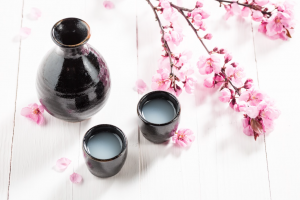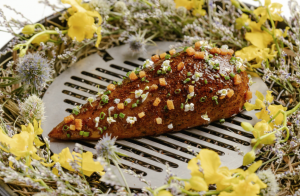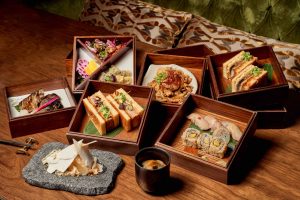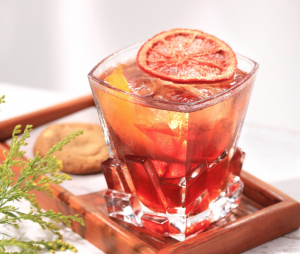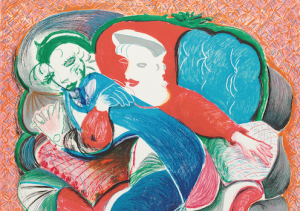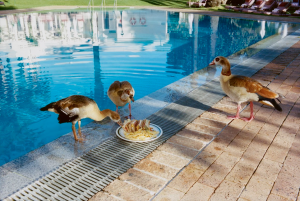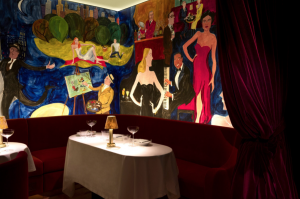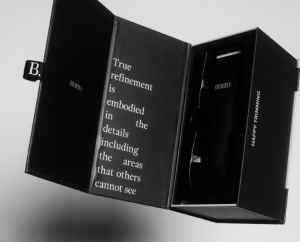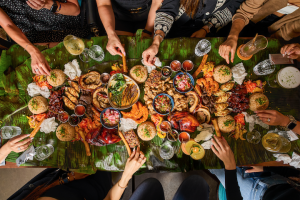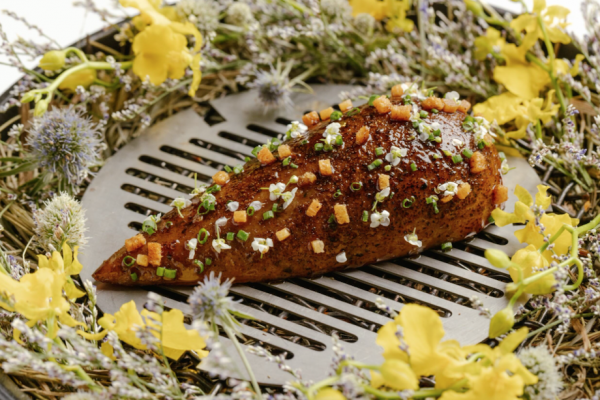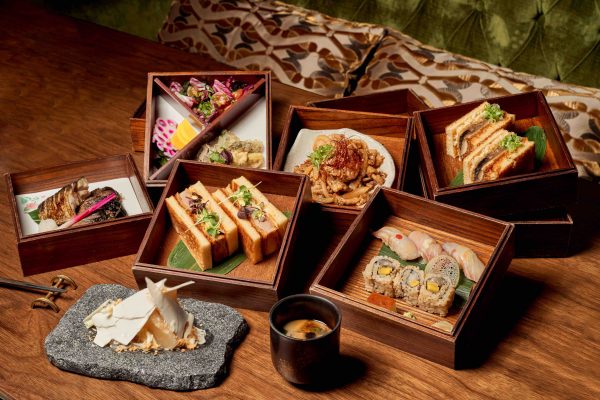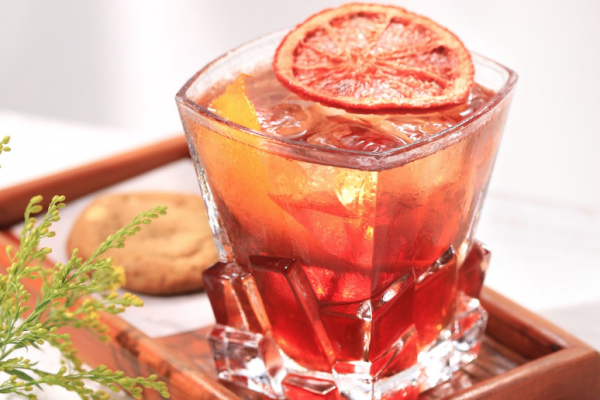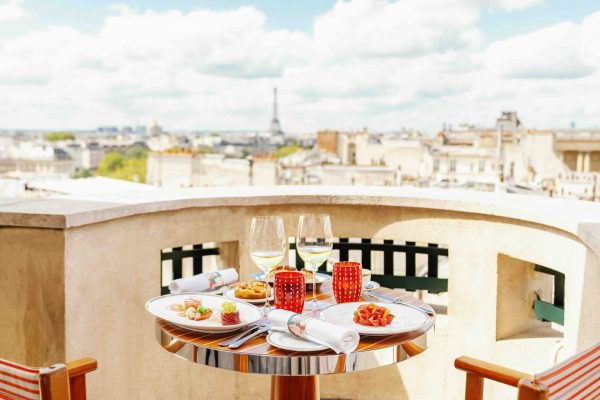Executive chef-founders Romain Dupeyre and Adrien Castillo of the newly awarded one-Michelin-star Racines talk to Stephenie Gee about what the accolade means, how they got here and why they work so well together
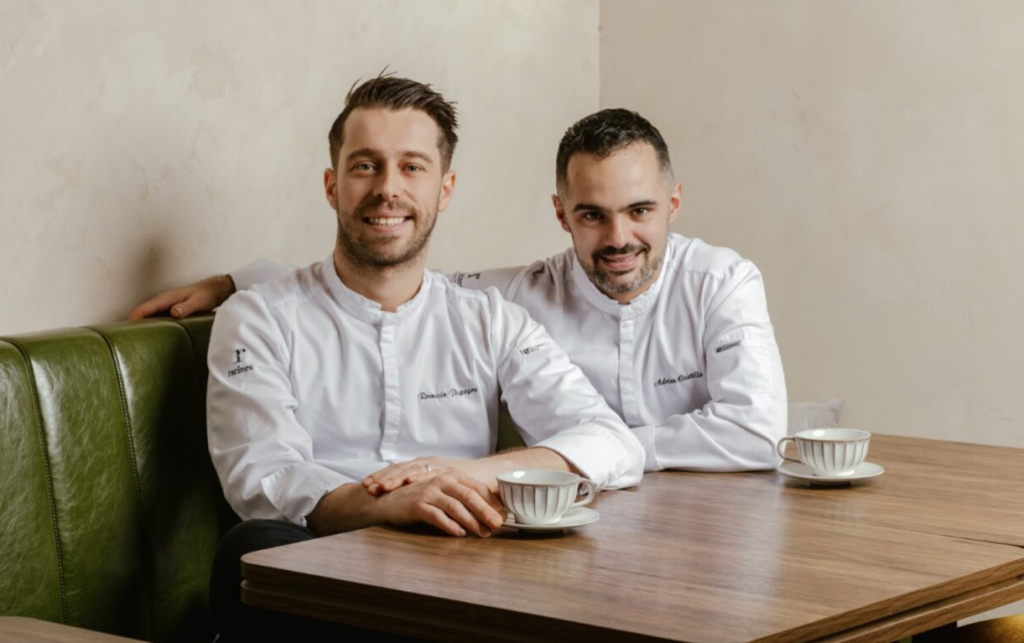
Romain Dupeyre and Adrien Castillo are tired, and rightly so. When we meet in late March, the chef-founders of Racines are fresh off celebrating their first Michelin star. I arrive at the restaurant just after lunch and the pair are in the kitchen working hard making the final tweaks to their new spring menu that is set to launch that evening. I’m told it’s going to be a full house. As was the night before. And before. In fact, it has been nearly every day since its opening in November 2022, and is set to continue, with a series of upcoming collaborations with fellow chefs and friends from around the world, including Louise’s executive chef Franckelie Laloum and Miko Calo from the Philippines.
“We feel unbelievably happy,” Dupeyre says. “It’s been a long, long, long journey. We’re a small business so it’s been tough. But we’ve been working hard with the team and with the support of the owners. Getting a Michelin star was especially the dream of Gregory Alexandre, one of the owners, who sadly passed away last year. But we are really happy. We’ve been working for 20 years so it’s a good achievement for us.”
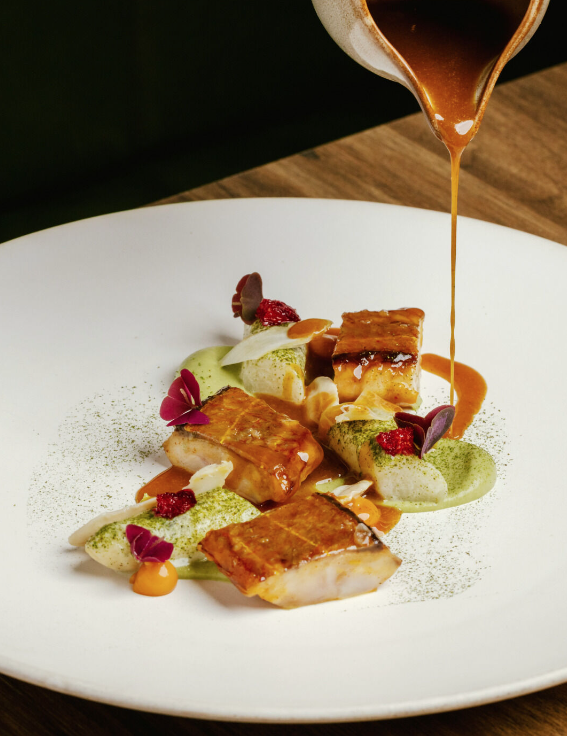
Hailing from the south of France, the pair first met in their teens in the kitchen of the two-star La Chèvre d’Or on the French Riviera. Years later in 2010, they chanced upon each other again at Shangri-La Paris. In 2016, Castillo and Dupeyre reunited at the reopening of the Ritz Paris, before finding their separate ways to Hong Kong to work at Caprice and Petrus, respectively. “It was my third job as a head chef in a hotel. I had had enough working in hotels and I really wanted to open something,” recalls Dupeyre. “Adrien was looking for a job as well and Greg had this place vacant. It’s good, actually, because Adrien and I worked together back when we were kids. And I remember one day after a bad service, we talked about opening up our own restaurants and doing whatever we wanted. So it’s funny that 17 years later we finally did it.”
French for “roots”, Racines is grounded in nostalgia. The interiors – think organic textures and muted earth tones, natural wood and marble details, and a gnarled branch installation – draw inspiration from the ancient borie dry-stone huts from southern France and the town of Èze where they first met. For the main course, guests can take their pick from a selection of handcrafted knives, each engraved with the name of a place or person that holds significance to the chefs or plays an important role in their shared history: La Chèvre d’Or; Périgueux, Castillo’s native city; Christophe, Dupeyre’s father who cultivated his love for good food and good wine; Mamie Cocotte, Castillo’s grandmother and his first inspiration. Food is a sentimental experience for Castillo and Dupeyre, whose journey to cooking was inspired by their grandmothers’ love and who both hold fond memories of running through their gardens. These themes carry forward into the menu, with dishes that pay homage to childhood and kitchen memories, as well as classic and familial southern French recipes.
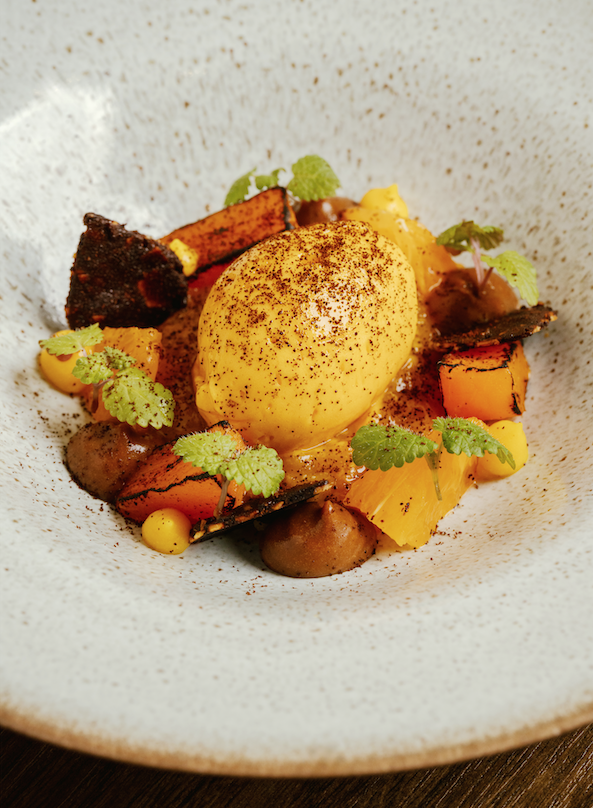
“It’s just three things: flavours of origin, childhood memories and seasons. This is how we build the menu,” Dupeyre says. “But we’re not just putting some caviar and langoustine on a plate and telling you, ‘This is beautiful’. We take risks.” Tradition without innovation is stagnant, so Castillo and Dupeyre strive to infuse their creations with a contemporary twist, be that through flavours, techniques or presentation.
Take the Spanish carabinero. Castillo’s current favourite on the menu, the prawns are lightly poached in lavender olive oil from Nice – a nod to Dupeyre’s childhood days spent at his grandfather’s lavender field – lending a delicate aroma that blends harmoniously with the fresh lemon zest and touch of fleur de sel that top the dish. The broccoletti on the side offers a visual and textural contrast. While the lavender-infused prawn consommé jelly adds a depth of flavour, as does the vinaigrette drizzled tableside, made with shrimp heads, Dijon mustard, white balsamic vinegar, lemon juice and lavender olive oil.
Or, the frog legs. In the southwest of France, they are served with snail ravioli and watercress. At Racines, gyoza takes the place of ravioli for an Asian touch, and watercress is swapped out for local green peas and celtuce. Offered as an add-on, the crowd favourite Brittany pigeon is a riff on a recipe from Castillo’s grandmother, whose recipe would be updated according to the season and the available produce. The bird is roasted in liquorice butter to perfection and finished with a liquorice pigeon jus that tames out the gaminess of the pigeon and unites the flavours as one. A Thai baby eggplant brings the dish a tangy boost, fermented for eight-and-a-half months and stuffed with pigeon liver, heart and foie gras.
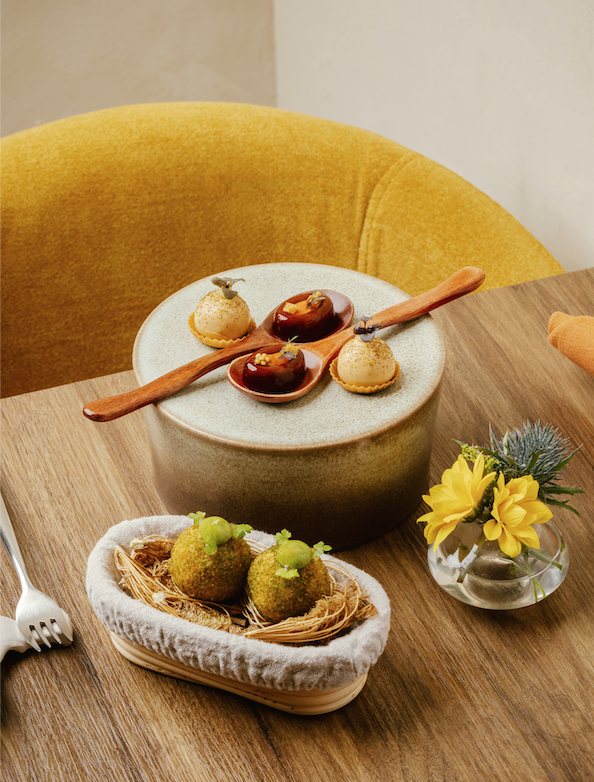
All that aside, what is really important is that each dish is a shared creation. “All our dishes are done by the both of us. There’s never a dish that is like, ‘Oh, I’m going to do it because I have this inspiration,’ because if we do it like that, there’s no connection between the dishes and the menu isn’t going to flow. And people are able to feel and taste the difference,” Dupeyre says. “In our menu, there are no gaps. Each course builds off one another. If we were to make one dish each, the way it’s done at a lot of four-hands dinners, it would be a rollercoaster. We want the journey to be like take-off.”
The pair’s respect and support for each other is mutual. There are arguments, of course, but they complement one another and together propel Racines forward. Castillo is water, Dupeyre says, and he is fire. “I’m difficult. I have many requirements. I’m really exact on what I want, and I don’t allow mistakes more than three times. Honestly, I wouldn’t work with myself. I’m realistic as well, so I’m always like, ‘This is not good. It’s not good. It’s not going to be better. But Adrien, he’s positive and he’s patient. His life,” Dupeyre’s hand draws across the air in a flat line, “is like this. That’s his biggest strength and the reason why we’re able to work together so well, really. If we had someone a little bit more like me, it wouldn’t work.”
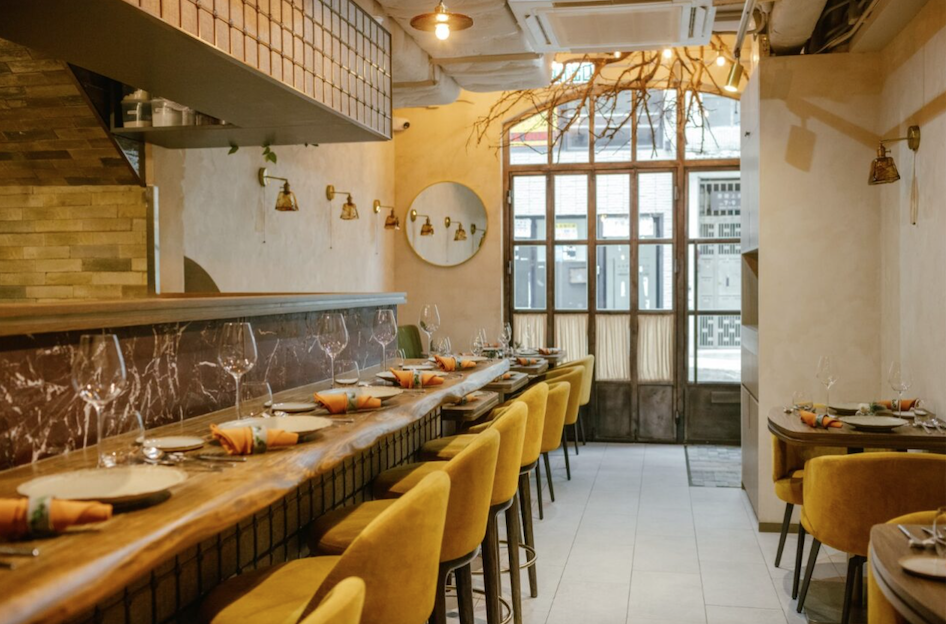
“We would have closed after two months,” Castillo jokes. “It would be too much fire. But I think we are very lucky. There are not many friends who can work together like this and I’m very happy to have Romain with me. He sticks to the deadlines and is always pushing us to do better, telling us we can do more, do better: ‘Yes, it’s good,’ or ‘No, I don’t think it’s good enough.’ He’s a great leader and great at [uniting] people. And I believe that’s why we were able to get this star.”
It’s assured the same energy and drive can be expected even now. “We’ve worked all our life in fine dining so this Michelin star is a huge achievement. We still can’t believe it – when we go home at night it’s like, ‘Wow, we got a Michelin star!’ But it doesn’t change who we are and what we do,” Castillo says. Dupeyre concurs: “It’s funny, I was just at a friend’s wedding in Cambodia and when I arrived, many people came up to me saying, ‘Oh, you’re a Michelin-starred chef now!’ And I was like, ‘Would it have been different if I came one month ago? Would they have been as impressed?’ It’s really quite funny, I think, because the perception people have of us has changed, but we are still doing the same thing now as we were before.”
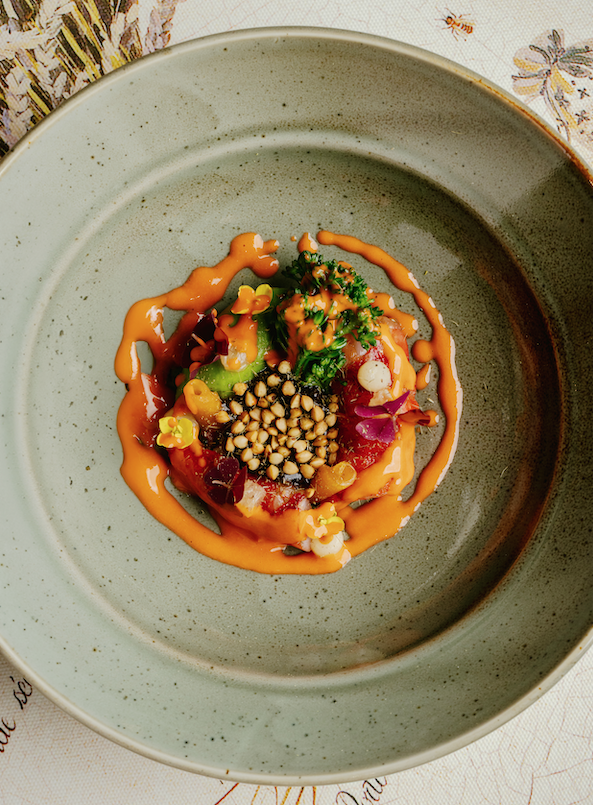
As ever, dining at Racines is an indulgent, warm and convivial experience. And that’s exactly what Castillo and Dupeyre intended. Excellent chefs and, above all, excellent company – friendly, solicitous and good-humoured – they make it a point to hit every table every night, to share a toast, to crack jokes, to banter, and to extend birthday and anniversary wishes. “We want to create an atmosphere that’s like our house,” Castillo says. “You come in, sit in our living room, and we’ll cook for you.”
Dupeyre continues, “We want people to feel relaxed and not stuffy, which is what fine dining can sometimes be. Because this is our personality. We’re quite sociable people. We’re easygoing. Quite funny. And I do think that’s why people come back. People come at first for our food, but now they come to see us. Last night was Adrien’s birthday and we had this big bottle of Champagne. We opened it and served all our guests a glass, and after that brought out his cake. Normally you do this when the guests have left, but we had such a great vibe. We took a picture with all of them and everyone got a slice of his cake. Give me the name of another Michelin restaurant that does this kind of thing. None!”
Also see: Chinesology’s chef Saito Chau on Tang-ren gastronomy and East-meets-West cocktails






